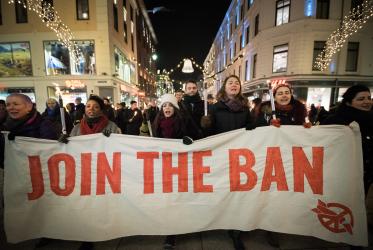In a statement “Towards a Nuclear-free World”, the Central Committee of the World Council of Churches (WCC) recommended ways for churches to work to end nuclear dangers and respond to the witness of those affected by continuing nuclear tragedies – from Hiroshima in 1945 to Fukushima in 2011 and beyond.
The WCC calls member churches to deepen ethical and theological debates about civilian and military uses of nuclear energy and examine “the witness inherent in using nuclear electricity or in accepting protection from nuclear weapons.”
Changes in lifestyle and the adoption of cleaner, safer, renewable energy sources are recommended in the statement. Divestment is encouraged where businesses and banks are involved in the production of nuclear power plants or nuclear weapons. Churches are urged to listen to, support and advocate with the survivors of nuclear accidents, bombings and tests.
The document invites the churches to join the WCC in coordinated international advocacy towards a ban on nuclear weapons “in accordance with international humanitarian law and in fulfilment of existing international obligations”. Collaboration is emphasized with others who share that goal – governments, other religions and civil society groups including the International Campaign to Abolish Nuclear Weapons (ICAN).
A special appeal is made to 31 governments in NATO and in Northeast Asia “which call for nuclear disarmament but depend on the nuclear forces of the United States”, to join in eliminating nuclear weapons, removing them from their regions and negotiating collective, non-nuclear security agreements instead.
The statement says nuclear weapons, with impacts that breach space and time, “cannot be reconciled with real peace”. It notes that “the overall trend among nuclear-armed states is to modernize rather than eliminate their nuclear arsenals”.
“The related technology of nuclear energy is a peculiarly hazardous form of development” for people, community life and natural ecosystems, the statement continues. Nuclear power does not meet standards for “responsible and inclusive stewardship” required of energy today. It has not proven to be safe, renewable, affordable or sustainable, it is “laden with risks which are difficult to manage,” according to the statement. Governments that subsidize nuclear power plants are simultaneously accepting high risks, exposing their publics to risks and funding with public monies an industry shunned by private investment.
Nuclear power is the pathway to acquiring nuclear weapons, the statement says, while pointing out parallel health, humanitarian, environmental and security dangers in civilian and military uses of nuclear energy.
A section on theological challenges says, “God is a generous Creator, calling life into being from atoms and molecules and endowing creation with life in abundance. To split the atom into deadly, unnatural elements already gives cause for serious ethical and theological reflection. To use the energy of the atom in ways that threaten and destroy life is a sinful misuse of God’s creation. We are called to live in ways that protect life instead of putting it at risk—neither living fearfully, defended by nuclear weapons, nor living wastefully, dependent on nuclear energy. We are invited to build communities and economies in harmony with God’s manifold gifts and promises of life.”
The need for the new policy was recognized at the WCC 10th Assembly in Busan, Republic of Korea, last year and the drafting was completed at the current Central Committee meeting in Geneva. The document cites a series of calls from ecumenical and inter-religious meetings in Europe, North America and especially Northeast Asia, where nuclear explosions, accidents and threats have already taken a heavy toll. “We proclaim the need not for the security of the status quo of nuclear-armed states but for the securing of life for all humanity and creation,” says one call issued in 2012 by an association of Korean Christians.
Read full text of the statement “Towards a Nuclear-free World”





